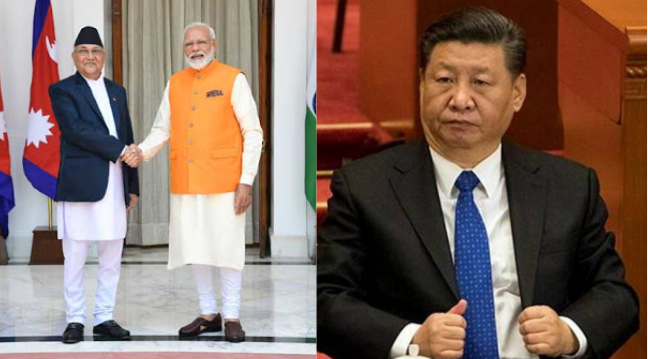A move that insinuates that Nepal has royally snubbed China and picked its friendship with India must be giving a major headache to Xi Jinping whose dreams of cornering New Delhi by hijacking the Himalayan country are seemingly bursting into flames. According to media reports, authorities in Nepal have agreed to fast-track a rail connection from their capital Kathmandu to the Indian mainland – thereby immediately culling China’s plan of building a rail line that might have helped it erect a tent in India’s immediate neighbourhood.
In August 2018, the Modi government had announced its plans to build a 130-km (80-mile) train line from its northern border city of Raxaul to Kathmandu. After stalling for an extended period, the Nepalese authorities have finally permitted India’s Konkan Railway Corporation Limited to carry out a Detailed Project Report (DPR) to connect Kathmandu with Raxaul. It is imperative to note that Raxaul is Nepal’s gateway to India as it is connected by rail with New Delhi and Kolkata, providing a vast hinterland.
Analysts have stated that by connecting Nepal with India along tracks which are of a different gauge, New Delhi has prevented China to bring its railway, and in the worst-case scenario, its troops, and equipment, close to the Indian border. Chinese rail tracks follow standard gauge, which is 1,435 mm wide. On the contrary, Indian broad-gauge tracks have a width of 1,676 mm. China has been aggressively lobbying to build a rail line from Kathmandu to Tibet but so far the communist state hasn’t been able to make major headways.
Reported by TFI previously, it was within a month that New Delhi swayed Kathmandu back into its fold by sending its top officials to the Himalayan state. The visits from Foreign Secretary to Army Chief to RAW’s chief have rekindled the old bonhomie between the two countries.
Read more: India snatches Nepal back from China’s grip in just one month
Secretary Harsh Shringla, was the latest to visit Nepal where he called upon his Nepalese counterpart, and also met Prime Minister Oli. Shringla also met the Nepalese President and Foreign Minister. PM Oli conveyed “Nepal’s desire to build on the momentum in the bilateral relationship and enhance the level of bilateral engagement.”
The contentious boundary issue also came up for discussion between the two sides, and a Nepalese release noted, “Both sides shared their perspectives on boundary matters and discussed ways to take it forward under the appropriate bilateral mechanisms.” Late last month, India’s intelligence (RA&W) Chief also visited Nepal, and called upon PM Oli, assuring him that India will not allow interruption in the friendly bilateral relations with Nepal and resolve all outstanding issues through dialogue.
The visit by the RA&W Chief came ahead of the Indian Army Chief, Gen. Manoj Naravane visiting Nepal to reset the bilateral ties between both countries. The visit was significant as General Naravane became the highest-ranking Indian dignitary to meet the Nepalese leadership in the backdrop of the Kalapani territorial dispute. In fact, Gen MM Naravane was even conferred the honorary rank of General of the Nepali Army by President Bidya Devi Bhandari.
It was only after these visits that KP Oli is believed to have told the Chinese Ambassador Hou Yanqi that he was more than capable of handling challenges within his party without any assistance from other countries. Yanqi in the past has acted as the bridge between Kathmandu and Beijing. More often than not, she has hijacked KP Oli’s authority and conducted meetings with the cabinet ministers and the opposition alike to sway the narrative in favour of China in the Himalayan country.
Nepal and India have been thick as thieves in the past before China swooped in and started orchestrating its nefarious plans. Nepal which had always sided with India’s version that Pakistan was a terrorist and rogue state seemingly started toeing China’s line on the issue. However, after Oli’s change of heart, the Nepalese citizens who have always been close to India, despite the government’s opposite stance took to the streets to show solidarity with India.
A candlelight march was held on the 12th anniversary of the dastardly Mumbai 26/11 attacks outside the Pakistan mission in Kathmandu by around 40 participants. The demonstrators walked in front of the mission for an hour, shouting slogans and carrying posters, protesting against the 26/11 Pakistan sponsored attack.
The development of the railway line is supposed to be the final nail in the coffin for China, whose short yet highly controversial affair with Nepal has come to an end as New Delhi takes matters into its own hands.
